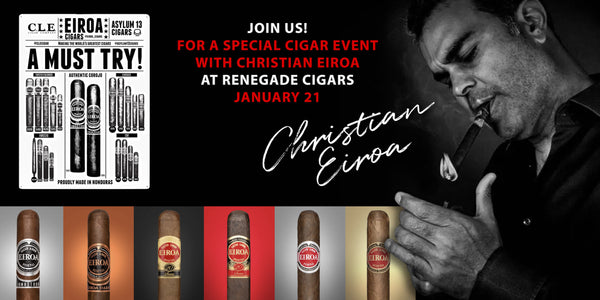The Story of Eiroa
Brandon Hayes

Many cigar aficionados might recognize the Eiroa name, but the family heritage in the cigar business might surprise you. With roots in the cigar business dating back to 1916 (when Generosa Eiroa worked for the Cuban Land and Leaf Company), the Eiroa family has been involved in Tobacco for over 100 years.
While Generosa was the first Eiroa to be involved in the tobacco business, his son Julio Eiroa was also involved in the Cuban Cigar industry before his exile in 1961. Upon his exile, Julio traveled for a while (he even worked for Oliva for a short period of time). Eventually, Julio made his way to the Jamastran Valley of Honduras and purchased Camacho Cigars from Simon Camacho, in 1995. At the time of purchase, Camacho was making their cigars in Nicaragua, and production was quickly moved to Honduras.
In 2001, Julio reached out to his son Christian for help managing the company. At 26 years old, Christian Eiroa was brought in to manage Camacho, after the finance company he was working for was sold. Christian wasn't thrilled with the idea of working for his father, but he saw it as an opportunity he couldn't pass up. Christian focused on producing blends using the authentic Corojo that was being grown at the family's farm. Originally selling for just $1.95 and $2.95 a cigar, the company found success early on (so much so that they raised prices by $1 almost instantly). Every month between 2001 to 2008, the company grew sales month over month.
A good portion of this success can be attributed to the amount of travel that Christian was putting in (over 90,000 miles on his car and flying over 200 hours a year). Selling cigars by hand, Christian convinced the US consumer that Honduran tobacco was worth trying and it led to a Corojo craze. This consumer demand for Corojo eventually led to Davidoff purchasing Camacho, with Christian's travel load being a factor in the decision-making process. After spending 40 out of 52 weeks on the road, Christian wanted to spend more time at home. After the sale, Christian stayed on board for a few years at Davidoff to oversee the transition, but exited after the businesses had fully integrated.
A few years later, Christian dove back into the cigar business with the foundation of CLE cigars in Honduras, and partnered with his longtime friend Tom Lazuka to found Asylum cigars in Nicaragua. CLE was for his traditional cigars, and Asylum was for implementing crazy ideas (such as abstruse formats like 7x70 and 8x80). Both were quick successes and the Eiroa brand was founded to use the companies hand-picked leaves with extra-long maturation processes and specially built boxes. Despite being one of the most in-demand companies in the industry, the brands still focus on Corojo tobacco grown at the family farm in Honduras, operated by Julio.
Soon, we will be taking a deeper dive into the Corojo leaf and what makes it unique. Join us then!

